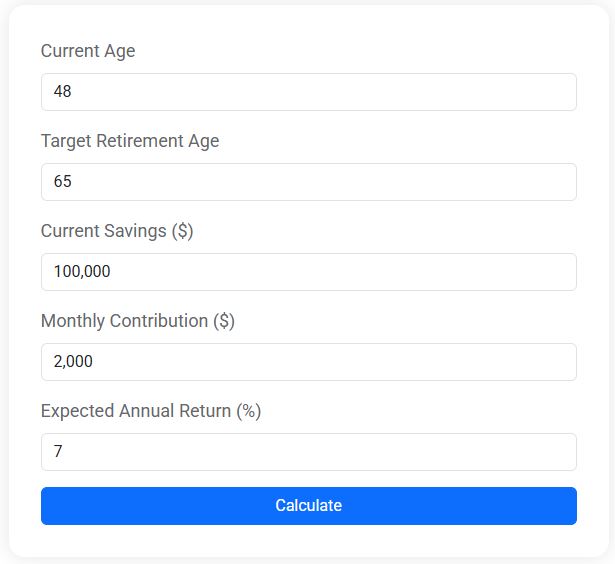Retirement Planning for Millennials: Starting Early

Retirement planning is crucial for millennials, who can greatly benefit from starting early due to the power of compound interest, which allows even small contributions to grow significantly over time. By understanding and utilizing various retirement accounts, setting realistic savings goals, balancing debt with savings, and adapting to life changes, millennials can build a secure financial future. Despite current financial pressures, prioritizing retirement savings can lead to a comfortable retirement and peace of mind.
Retirement can feel like a distant dream when you're a millennial juggling student loans, rising living costs, and the urge to travel the world. Yet, despite these financial pressures, now is actually the perfect time to start planning for your golden years. The secret sauce to a comfortable retirement? Starting early, thanks to the magical power of compound interest. It might not seem glamorous, but the earlier you start saving, the more time your money has to grow. Even small contributions can snowball into a substantial nest egg over the decades.
Understanding the ins and outs of retirement planning may seem daunting, but with a bit of guidance and a proactive mindset, it doesn't have to be. By familiarizing yourself with different retirement accounts, setting achievable goals, and finding the right balance between saving and living, you can pave the way to a secure financial future. This isn't about sacrificing all your present-day pleasures; it's about making informed decisions that align with your life and values.
The Power of Compound Interest
Albert Einstein reportedly called compound interest "the eighth wonder of the world," and for good reason. It's the principle of earning interest on your interest, and it can dramatically amplify your savings over time. For millennials, who have the luxury of time on their side, this can mean the difference between a modest retirement fund and a robust one.
Consider this: if you start saving $200 a month in a retirement account with an average annual return of 7% at age 25, you could have over $500,000 by age 65. Wait until you're 35 to start, and you'll have less than half of that amount. The earlier you start, the more you benefit from compound interest. It's like planting a tree; the sooner you get it in the ground, the bigger and stronger it will be in the future.
Understanding compound interest isn't just about math; it's about changing your mindset. It helps to see saving for retirement as a marathon, not a sprint. Small, consistent contributions can exponentially grow your savings, so don't dismiss the impact of starting with what you can afford today.
Navigating Retirement Accounts
One of the first steps in retirement planning is choosing the right kind of account. For many millennials, employer-sponsored plans like 401(k)s are a good starting point, especially if your employer offers a matching contribution. That's essentially free money, and you'd be wise to take full advantage of it.
But what if you're self-employed or your job doesn't offer a retirement plan? Options like a Roth IRA or a Traditional IRA can be excellent alternatives. As financial planner Kelly Johnson notes, "Roth IRAs are particularly appealing to younger savers because you pay taxes on contributions now, while you're likely in a lower tax bracket, and enjoy tax-free withdrawals in retirement."
It's crucial to understand the differences between these accounts, including tax implications and contribution limits. Doing your homework or consulting a financial advisor can help tailor your retirement strategy to fit your specific circumstances and goals.
Early Retirement Calculator
Thinking about retiring early? Our free Early Retirement Calculator helps you figure out exactly how much you need to save and invest to reach financial freedom sooner. Whether you're aiming for early retirement at 55, 50, or even 40, this tool gives you a personalized projection based on your current savings, monthly contributions, and expected return on investment. Start planning your path to financial independence today.
Setting Realistic Savings Goals
When it comes to retirement savings, setting realistic and achievable goals is key. Start by considering what kind of lifestyle you envision in retirement. Do you plan to travel extensively, or are you dreaming of a quiet life in the countryside? These visions will guide your savings targets.
Experts often recommend aiming to replace about 70% to 80% of your pre-retirement income to maintain your current lifestyle. This might seem daunting, but breaking it down into smaller, manageable savings goals can make it more achievable. Use tools like retirement calculators to estimate your needs based on your current income and saving habits.
Remember, these goals are not set in stone. Life changes, from marriage and children to unexpected expenses, can affect your ability to save. Regularly revisiting and adjusting your goals ensures they remain aligned with your evolving life and career.
Balancing Debt with Savings
One of the biggest challenges millennials face is balancing debt repayment with saving for retirement. With student loans, credit cards, and mortgages potentially competing for your paycheck, retirement savings can feel like a luxury rather than a necessity. However, neglecting it can lead to financial stress later in life.
Financial advisor Mark Davis suggests a balanced approach: "Focus on high-interest debt, like credit cards, first, but don't completely ignore retirement savings. Even if it's a small amount, getting into the habit of saving is crucial."
Consider strategies like the debt snowball or avalanche method to pay down debt efficiently while still contributing to your retirement. Automating your savings can also help ensure you're consistently putting money aside, no matter what life throws your way.
Adapting to Life Changes
Life is full of surprises, and your financial plan should be flexible enough to adapt. Whether you're switching careers, starting a family, or experiencing a financial setback, your retirement strategy may need adjustments along the way.
Keep in mind that life changes can also bring opportunities. A new job might offer a better retirement plan, or a raise could allow for increased contributions. The key is to remain proactive and regularly review your retirement plan to ensure it reflects your current situation and future aspirations.
As you navigate through these changes, don't hesitate to seek advice. Whether it's from a professional financial advisor or a trusted friend who's savvy with money, outside perspectives can provide valuable insights and help you stay on track.
The Peace of Mind of Prioritizing Retirement
Despite the immediate financial challenges that many millennials face, prioritizing retirement savings is a gift to your future self. It may not always be easy, but the peace of mind that comes from knowing you're building a secure financial future is invaluable.
Think of it as a long-term investment in yourself. By starting early and staying consistent, you're not just aiming for a comfortable retirement—you're ensuring that you can maintain your independence and enjoy the lifestyle you desire without financial worry.
So, grab that cup of coffee, sit down with your budget, and start planning for the future. Your older self will thank you.








